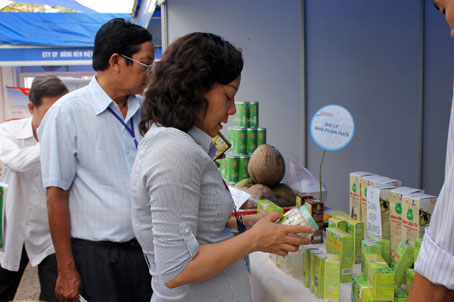
The country's five south-eastern provinces should review zoning plans to make it easier to distribute Vietnamese goods, a Government official said.
 |
| Vietnamese products at the conference |
The country's five south-eastern provinces should review zoning plans to make it easier to distribute Vietnamese goods, a Government official said.
Le Viet Nga, deputy director of the Domestic Market Department, told a conference organised by the High Quality Vietnamese Products Business Association and Ba Ria-Vung Tau Province on Tuesday that the provinces should offer incentives to develop their trading infrastructure.
The provinces are Ba Ria-Vung Tau, Binh Duong, Binh Phuoc, Dong Nai, and Tay Ninh, and the event was the first activity under an agreement the association signed last month with their industry and trade departments to help businesses expand in the region.
Nga also called on the five provinces to establish close links with local producers to set up an efficient distribution system for locally-made goods.
Vu Quoc Chinh of the HCM City-based Business Study and Assistance Center said the region, with a higher income than other regions, is a promising market for Vietnamese goods.
Its total retail goods turnover in 2010 was an estimated VND162.77 trillion (US$7.79 billion), accounting for 10.5 per cent of the country's total.
But despite its potential, not many local producers have agents or shops there, Chinh said.
Vu Kim Hanh, chairwoman of the High Quality Vietnamese Products Business Association, said traditional markets are the main distribution channel in the region, but since local firms do not promote their products at these markets, the ratio of Vietnamese goods they sell remains very low.
Tran Ngoc Thoi, deputy chairman of the Ba Ria-Vung Tau Province People's Committee, said a scattered distribution system and lack of co-ordination among localities has meant the region's retail sector has failed to meet its potential.
Delegates listed the difficulties in penetrating this market, including a shortage of market information and poor distribution system.
Besides, they hesitated to take their products to the traditional markets because they had too many shortcomings like poor infrastructure, lack of hygiene, and selling of dubious products. To increase sales of Vietnamese goods at the traditional markets, delegates agreed that besides improving infrastructure, provincial authorities and enterprises should also pay more attention to improving small traders' sale skills.
(Source: VNS)





